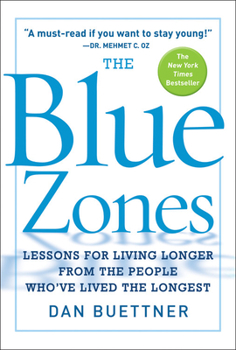The Blue Zone: Lessons for Living Longer From the People Who've Lived the Longest
Select Format
Select Condition 
Book Overview
Bestselling author, longevity expert, and National Geographic Explorer Dan Buettner reports on health, fitness, diet, and aging, drawing on his research from extraordinarily long-lived... This description may be from another edition of this product.
Format:Paperback
Language:English
ISBN:1426204000
ISBN13:9781426204005
Release Date:April 2009
Publisher:National Geographic Society
Length:320 Pages
Weight:0.96 lbs.
Dimensions:0.7" x 4.2" x 6.9"
Customer Reviews
2 ratings
Beam me to the Blue Zones!
Published by Thriftbooks.com User , 15 years ago
Blue . . . the color of peace, tranquility, and everlasting life. Standing at the edge of the ocean, big waves splashing cool, salty water over my toes, I look out over the ocean and up at the turquoise sky, feeling as one with the earth. The ocean, where life began, and the sky, where my soul will later disappear, show the color blue as far as I can see. Somewhere in between the beginning of life and eternity lies the Blue Zone, a place offering longevity, good health, and contentment. While the Blue Zones described in Dan Buettner's chronicle are found in four specific locations broadly spread across the earth, he tells us in detail how we can create our own "Blue Zone." These four places, populated with many centenarians, share their secrets with us through the magnificent stories told to us by Dan Buettner. I ran across a newspaper article about The Blue Zones when I was researching why obesity seemed prevalent in certain departments of my company. It seemed to me there must have been a great deal of negative influence on each other, perhaps a contagious attitude of not caring what they eat. Dan confirmed what I suspected, stating that studies have shown that if your three best friends are obese, you have a 50 percent greater chance of also being obese. The Blue Zones have taught us that in order to live longer, healthier lives we need to surround ourselves with the right people, people who reinforce the right habits. We can learn so much from the inspiring stories of the people in this book. Marge Jetton, 100 at the time the book was written, is shown in a photograph lifting weights. She begins each day with a mile walk, a stationary bike ride, and (of course) lifting weights. In our literary visit to Costa Rica, we meet Juvenil Munoz, a 90 year old man who eats mostly beans, tortillas, fruit, and once a year, beef when he butchers a cow. Yes, you read that right, just once a year he eats beef. These are just two of the amazing people you will meet in this book. Why don't you order it so you can meet the others? You'll learn something special about life from each and every one. Some books are for dieters, some are for athletes, and some are for cooks. The Blue Zones is for everyone. Even if you're one of the few people who don't care about living a long life, you'll love the journey through this book. It is like no other you've ever taken. Beam me to the Blue Zones!
Ten star sane, interesting, thought provoking book
Published by Thriftbooks.com User , 16 years ago
Published by the National Geographic made this book a reliable read for me. It is so full of valuable information, including the website http://www.bluezones.com mentioned in the book on page 228 where you can do the Vitality Compass. And one of the many wise pieces of advise given (page 213_ deals with learning to move or be active without thinking about it. Liked this, because I see so many people over the age of seventy where I live out walking for walking enjoyment, not for any physical fitness routine. Same with going to the gym. People I know simply see everyday movement as natural and healthy. Lesson Five: Purpose Now Take time to see the big picture is something we need to start teaching our young. The whole idea of seeing a purpose however small in getting up in the morning. Lesson Seven: Belong Participate in a spiritual community shouldn't turn anyone off. Fact is their research shows that belonging to a community where one thinks about something bigger, and is around people who believe in prayer and positive purpose live not only longer but healthier and happier lives. They mention Dr Gary Frasers book Diet, Life Expectancy and Chronic Disease which is a good book. Also like the information on diet and how healthy eating doesn't mean boring or not fun. Simply eating less, and not so much meat can make a difference they say and I agree. They do NOT say never eat meat. Which reminded me of the exchange students we have had in our home whose eyes would grow big when they would see the steaks on the BBQ at peoples homes, and then see a steak plopped on their plate. This was a shock to them, because no matter if they were from Asia or Scandinavia, meat was more of a condiment, served in small servings, rather that THE meal.






